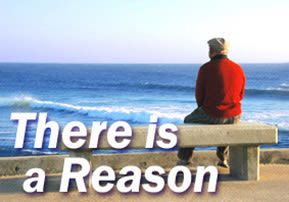
There is a Reason
Sitting perched on the edge of his bed, eating his meager meal, he felt absolutely miserable. Why did he have to come to such a God-forsaken place?...

As a senior executive for a growing high-tech company, Bobby often makes business trips to such exotic countries as India and Thailand. On a recent trip to Turkey, he found himself all alone in his hotel room, preparing a simple supper of sardines and matzos. He was feeling miserable. The closest Jewish community was over a hundred miles away. Instead of attending shul and listening to an inspiring Torah lecture, he was planning to daven Maariv alone and get to bed early. He had a long day ahead of him.
Bobby turned on his laptop. While waiting for the computer to boot, he washed his hands for bread and made a blessing over the stale matzos that he had brought with him from Israel. Sitting perched on the edge of his bed, eating his meager meal, he felt absolutely miserable. Why did he have to come to such a God-forsaken place?
Bobby popped a CD into his computer. It contained a lecture by Rabbi Tzvi Aryeh Rosenfeld z”l on Sichot Haran 23. As if in answer to his unspoken question, Bobby heard his rabbi’s voice explain:
“Let’s say that a Jew travels to a remote corner of the globe, to a different continent that he’s never visited before, such as Thailand or Hong Kong. He has to be there for several days, but there are no Jews around — no shul, no kosher restaurant. He quietly davens, alone in his hotel room, and then takes a few cans of kosher food from his suitcase, washes, and makes a blessing before eating. He feels completely isolated. What’s he doing there?“But there is a reason for him being there. Although he may think that he is all alone, completely isolated from the Jewish community, he’s not really alone. There are hundreds, if not thousands of Jewish souls assembled there – actually imprisoned there – waiting for a living Jew to come and perform a mitzvah to release them from their imprisonment and allow them to go to their ultimate destination. Imagine how these souls suffer as they wait for a Jew to arrive and perform a mitzvah that will release them from their misery!”
* * *
Bobby is a close student of Rabbi Tzvi Aryeh Rosenfeld z”l (1922-1978). Rabbi Tzvi Aryeh taught Breslov in America at a time when Breslov was basically unheard of. As Bobby once told me, “When I told people that I was a Breslov Chassid, people asked if I meant Chabad.” Yet, today, there are hundreds of Breslov shuls in existence throughout the world. Rebbe Nachman’s words reach deeply into peoples’ hearts. Much of Breslov’s growing popularity is due to Rabbi Rosenfeld’s self-sacrifice to bring Jews close to Torah and Chassidut.
Recently I spent close to two weeks in Southern California, with almost no access to a religious community. Shabbat, I sat alone, eating my meals, while around me people were taking pictures and watching television. “What am I doing here?” I thought to myself. “What purpose could there possibly be in my being here?”
But as Rebbe Nachman explains and Rabbi Rosenfeld elaborated, there are many, many things in this world that exist on a spiritual plane, which we will never even begin to understand.
We can, however, begin to understand the purpose of things that perplex us through asking ourselves a very simple, yet important, question: What did I learn from this, and how can I use what I learned to become closer to Hashem.
While visiting Southern California this summer, I heard a true story of a chassid, let’s call him Mr. Ruben, who was always looking for the meaning in whatever he saw. One time he watched in horror as a cat killed a bird who had swooped down to catch a worm. It was not a pretty sight, and the Chassid asked himself why Hashem had placed him in such a position that he was witness to it.
It took Mr. Ruben several years before he realized what that incident should have taught him.
Mr. Ruben was a plumber. Since he didn’t live in the best of neighborhoods, every evening he removed all his valuable plumbing supplies from his pickup truck and placed them in the security of his basement. One evening, however, he returned home unusually late. He was exhausted from crawling on his belly all afternoon, fixing a leaky pipe. “Every night, for the last three years,” he thought, “I’ve been shlepping my equipment out of truck and bringing it to the basement for safekeeping. Nothing’s ever happened. My truck’s never been stolen. Why should it be stolen tonight?” So instead of unloading his truck, he took the elevator up to his apartment and went straight to bed.
That night Mr. Ruben’s truck was stolen, together with all of his expensive plumbing equipment.
“The story with the bird was teaching me to never let my guard down,” Mr. Ruben explained. “The bird let its guard down, and was caught by the cat. I let my guard down, and lost my plumbing equipment. It’s the same thing with Yiddishkeit. When we let our guard down, the yetzer hara rushes in to catch us when we’re not looking, and then it’s even harder to get up and continue.”
After leaving Southern California, I spent a day in my home-town, San Francisco, hiking in Golden Gate Park and the Presidio. The scenery was breathtaking, the weather, cool enough to be comfortable without being cold. It was a perfect day for introspection and prayer.
I spent a lot of time asking Hashem what lesson I was to have learned from spending ten days in a place where God was almost an unmentionable word. How could my having been there enhance my own quest for spirituality?
I realized that I had gained the gift of empathy through seeing the challenges facing many of our readers. Living here, in Jerusalem, a city that is overflowing with holiness, I often forget how difficult it is for many of our readers to keep Shabbat, to eat kosher, to learn Torah, to connect to the Almighty, in the distant places where they reside. I know that while I was in a completely secular environment, davening became a real challenge, and at times I felt as if it was almost impossible. It’s easy to preach about prayer and emuna when one is not facing such constant challenges.
Being here in Jerusalem, I feel humbled before many of our readers who live in remote areas, far away from Jewish communities, yet continue –despite the challenges — to strive toward growth as they literally cleave to holiness in their quest for emuna. But, as Rabbi Rosenfeld explained in his class, there is a reason for our being in whatever place we find ourselves. Some reasons are beyond our comprehension, while other we can try to understand.
May we succeed in fulfilling our purpose and reason for being in this world as we elevate all those hidden sparks of holiness that are surrounding us.











Tell us what you think!
Thank you for your comment!
It will be published after approval by the Editor.